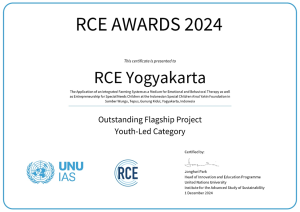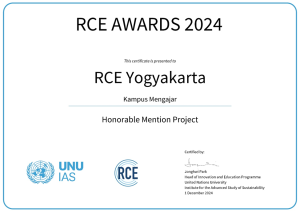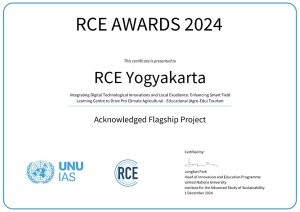Yogyakarta, Indonesia – The Regional Centre of Expertise (RCE) Yogyakarta has garnered significant recognition for its outstanding contributions to sustainable development, receiving three awards at the RCE Awards 2024. The awards, which highlight the transformative efforts of RCEs worldwide in advancing sustainability and achieving the United Nations Sustainable Development Goals (SDGs), were conferred on December 1, 2024, by Jonghwi Park, the Head of the Innovation and Education Programme at the United Nations University – Institute for Advanced Study of Sustainability. These awards underscore the critical role of RCE Yogyakarta and its strategic partnership with Universitas Gadjah Mada in addressing local and global sustainability challenges.
Outstanding Flagship Project: Youth-Led Category

The first award was received by RCE Yogyakarta for Outstanding Flagship Project in the Youth-Led category for its innovative initiative, The Application of an Integrated Farming System as a Medium for Emotional and Behavioral Therapy and Entrepreneurship for Special Needs Children. This project, proposed by Prof. Dr. drh. Sarmin, M.P., a faculty member of Universitas Gadjah Mada’s Department of Physiology, addresses the needs of children with special needs through integrated farming and therapeutic methods.
Implemented at the Indonesian Special Children Ainul Yakin Foundation in Sumber Wungu, Tepus, Gunung Kidul, the program engages children with special needs—ranging from autism and ADHD to Down syndrome—in farming activities that provide both emotional and behavioral therapy, alongside valuable entrepreneurship skills. The initiative utilizes 14 hectares of land owned by the Ainul Yakin Islamic Boarding School, which also serves as an inclusive education hub for children with special needs. Through collaboration with the local community and the government, the program establishes a circular economy that integrates livestock farming and provides a platform for enhancing life skills, cognitive development, and social interaction.
The program aligns with multiple SDGs, including SDG 4 (Quality Education), SDG 8 (Decent Work and Economic Growth), and SDG 10 (Reduced Inequality), as it empowers children to overcome disabilities, improve their quality of life and integrate into the broader society through education and employment opportunities.
Honorable Mention for the Kampus Mengajar Project
RCE Yogyakarta also received an Honorable Mention Project for its involvement in the Kampus Mengajar initiative, which has become a cornerstone in improving educational outcomes across Indonesia. Proposed by Dr. Gugup Kismono, M.B.A., Ph.D., and Asri Aldila Putri, S.Sos., M.Si., Kampus Mengajar places university students in underserved primary and secondary schools nationwide to serve as teaching assistants. The goal of this program is twofold: to enhance the 21st-century skills of university students, such as leadership, critical thinking, and problem-solving, and to improve literacy and numeracy in targeted schools.

This initiative has contributed to educational equity and boosted student motivation to pursue higher education, creating a ripple effect that raises the socio-economic status of entire communities. Through its innovative approach, Kampus Mengajar contributes to SDG 4 (Quality Education) and SDG 10 (Reduced Inequality) by fostering educational and socio-economic development, especially in rural and remote areas.
Acknowledged Flagship Project: Enhancing Smart Field Learning Centre
The third award recognized RCE Yogyakarta’s role in Integrating Digital Technological Innovations and Local Excellence: Enhancing Smart Field Learning Centre to Drive Pro-Climate Agricultural-Educational (Agro-Edu) Tourism. Proposed by Prieskarinda Lestari from Universitas Gadjah Mada’s Department of Agricultural and Biosystems Engineering, this initiative aims to create a sustainable and circular green economy in Sambak Village, Central Java, through a zero-waste, agro-tourism model.

The project integrates cutting-edge digital technologies with local agricultural expertise to establish a Smart Field Learning Centre that serves as a hub for climate-conscious education and eco-tourism. The project promotes sustainable agricultural practices, such as coffee agroforestry, and enhances environmental sustainability through biodigesters and waste-to-energy technologies. This initiative has received national acclaim, with Sambak Village earning awards for its climate action and self-sufficiency in energy.
The project is directly aligned with SDG 13 (Climate Action), SDG 4 (Quality Education), and SDG 12 (Responsible Consumption and Production). It empowers local communities, raises climate awareness, and improves productivity through sustainable agricultural practices, all while contributing to the broader goal of promoting responsible consumption and fostering environmental stewardship.
About RCE Yogyakarta and Its Support for SDGs through Education
RCE Yogyakarta is one of 174 RCEs worldwide and is recognized as a member of the Global RCE network coordinated by the United Nations University Institute of Advanced Studies (UNU-IAS) in Japan. It is a network of individuals, organizations, and institutions involved in education—whether formal, informal, or non-formal—working to deliver Education for Sustainable Development (ESD) to local and regional communities, particularly in Yogyakarta and its surrounding areas.
RCE Yogyakarta, which is based in Universitas Gadjah Mada, plays a central role in addressing critical sustainability challenges at the local and global levels. Through a range of community-driven initiatives, RCE Yogyakarta has made significant strides in advancing the Sustainable Development Goals (SDGs), particularly those related to education, economic growth, environmental sustainability, and social inclusion.
RCE Yogyakarta has shown how education, research, and technological advancements can be seamlessly integrated to build a more sustainable future by promoting innovative solutions and actively involving local communities. These awards underscore the vital role of partnerships between academic institutions, local governments, and communities in achieving the SDGs. The recognition of these projects further reinforces RCE Yogyakarta and Universitas Gadjah Mada’s unwavering commitment to fostering sustainability in all its dimensions.
Looking ahead, RCE Yogyakarta remains a source of inspiration, leading initiatives that contribute to creating more inclusive, sustainable, and resilient societies. Their work exemplifies how local efforts can make a meaningful global impact on sustainable development.
Tags: #SDG 4 #SDG8 #SDG10 #SDG11 #SDG12 #SDG13
writer: bil
